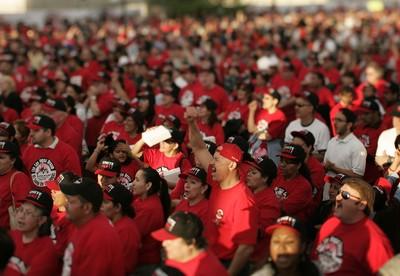Culinary aims to expand on momentum
Culinary Local 226 is riding the wave of expansion in Southern Nevada's hospitality sector.
The Culinary, which represents bartenders, cocktail servers, waiters, housekeepers, maids and laundry workers, has grown from 52,000 members to 60,000 members in the past two years.
It has relationships with employees of some of the industry's biggest businesses, including MGM Mirage, Harrah's and Wynn Resorts Ltd.
D. Taylor, secretary-treasurer of the 72-year-old union, credited the rising membership to growth in the resort sector and to aggressive organizing.
Though recruiting new members is always the Culinary's main focus, the union is also concentrating in early 2007 on contract negotiations with more than 40 local properties.
The Culinary's negotiators are eyeing several key issues in their contract talks, including maintaining members' health insurance benefits. Developing career-advancement opportunities is also a priority of the union, and wages will be an important bargaining topic as well.
"Nontip earners in particular have really gotten whacked" as the cost of living in Las Vegas has outstripped pay increases, Taylor said.
Culinary officials will also look at a defense fund for tipped earners to help in IRS audits and challenges.
Perhaps the biggest issue the Culinary aims to address is the rising price of housing.
When the union negotiated its current contracts in 2002, the median new home value in Las Vegas was $183,557, according to data from real estate research firm SalesTraq. That median reached $321,555 in February.
"Las Vegas was the last city left where a housekeeper could buy a home," Taylor said. "That's not true anymore. Las Vegas is at a crossroads as to whether it will be a service economy that allows for people in this industry to acquire the Las Vegas dream or whether we're going to be more like Southern California and other metropolitan areas."
Solutions thus far -- MGM Mirage plans to include work force housing within its Jean master plan, and Station Casinos sponsors programs to find grants for employees buying their first home -- don't help enough workers, Taylor said.
"We need a response that is both complex and well thought out down the road," Taylor said.
Taylor said he didn't know how strained negotiations might become.
The union's relationships with casino management vary from company to company, and he said particularly difficult bargaining sessions could result in a scenario similar to a monthlong, 10,000-worker strike Culinary members led against seven Atlantic City casinos in 2004. The sticking points involved wages and the contract's length.
Bill Thompson, a professor of public administration at the University of Nevada, Las Vegas, said he doesn't expect contract discussions to devolve into work stoppages in Las Vegas.
"If the issue is money, that's related to the profits of Las Vegas (hotel operators)," Thompson said.
"Las Vegas is doing very, very well. It should not be contentious, because that would put a monkey wrench into a really good thing we have going. We have profits up and workers are doing very well. A union dispute would hurt everybody, and I think the union enjoys the peaceful growth and prosperity we have. The demands labor is going to make will be compatible with the growth and prosperity we have."
Nor does Thompson expect Culinary officials to aggressively pursue members at nonunion hotels in Las Vegas.
Taylor wouldn't disclose pending organizing initiatives at nonunion properties, because he said identifying targets in advance of a campaign often results in management crackdowns on workers' potentially union-related activities. Major nonunion operators in Las Vegas include Station and the Las Vegas Sands Corp., which runs The Venetian.
Thompson said the Culinary "might make a run at Station," but it wouldn't be a "frontal attack." The union is large enough now that incremental growth in existing resorts and among unionized operators will sustain its expansion needs, he said.
Taylor would only say that Culinary officials expect to continue adding about 4,000 members a year in Las Vegas to the labor group's membership.
He's planning substantial growth in the next five to 10 years, both from union and nonunion properties.
"Organizing is always our top priority, along with contract negotiations," Taylor said. "But contract negotiations come and go. We are spending an enormous amount of time and resources on growth. We know that the more unionized the town is, the more leverage our members and future members can have."
The Culinary's growth objectives are achievable, Thompson said.
"The nature of new casinos is such that they will be unionized," he said. "They're big properties, and their operators already have unions. It's also very important to have labor peace in Las Vegas. The big operators understand this."

















